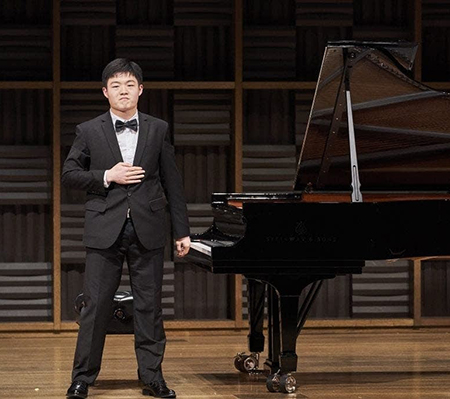by Mike Telin

On Saturday, March 2 at 8:00 pm at the Cleveland Museum of Art’s Gartner Auditorium, the Cleveland International Piano Competition Concert Series will present Xiaoxuan Li, the winner of the 2018 CIPC for Young Artists Competition senior division. His program will include works by Chopin, Rachmaninoff, and Liszt. The evening will also feature Eva Gevorgyan, winner of the 2018 junior division. Together, Li and Gevorgyan will play four-hand arrangements of excerpts from The Nutcracker.
Tickets are available online.
All of Li’s hard work has paid off. In addition to his CIPC win (click here to listen to his semifinal round performance), he was awarded second prize at the 2015 Hilton Head International Piano Competition for Young Artists, first prize at the 2015 Zhuhai International Mozart Competition for Young Artists, and fourth prize at the 2012 Ettlingen International Piano Competition for Young Pianists. As a concerto soloist, he has appeared with the Hilton Head Symphony, Ashdod Orchestra, Salzburg Chamber Soloists, and Macao Orchestra. The 17-year old is in his third year of studies at the Curtis Institute of Music.
“I’m enjoying being here,” Li said. “I like the environment and the piano faculty is great, not only for solo work but also for chamber music.”
A native of Zhejiang, China, Li will begin Saturday’s program with Chopin’s Barcarolle in F-sharp, Op. 60. “Every student my age has to learn this piece — you have to imagine the boat on the water.” The pianist will continue with Rachmaninoff’s Études-Tableaux in e-flat, Op. 39, No. 5 and Liszt’s Transcendental Étude, S. 139, No. 10 (“Appassionata”). “They are both showy and powerful, but the two are very different from one another.” He added that they are etudes so they each highlight a different aspect of technique.
As a veteran of competitions, what does Li gain from those experiences? “That’s a big question and one that we all think about. In competitions, we’re all professionals so the purpose is not just to win, the purpose is to study and challenge yourself. You also get to hear other people play and you learn from them.”
During our conversation, Li often referred to playing the piano as his job. “People ask if I like playing, but it is my work. I remember my first professional teacher asking me what I want to do in the future. My answer was that I wanted to be a responsible teacher. When I become an adult, I want to share what I know. I want to influence children to enjoy the music.”
In addition to studying music history and theory, Li is also enjoying the world of chamber music — he’s in a group working on Dvořák’s Trio No. 4 (“Dumky”) and Brahms’ Trio No. 3. He’s also collaborating on Beethoven’s Cello Sonata, Op. 5, No. 2.
“It’s fun to work with people. Chamber music is an interesting thing because you have to find people who are good players, but sometimes a person who is wonderful with solo work doesn’t know how to work in a group. Chamber music is not about showing your own personal skills, it’s more to show how to cooperate and how to unite your ideas.”
When not rehearsing and performing, Li enjoys playing table tennis, going to the gym, and listening to other styles of music with friends. “We like rock and popular, all kinds of music.”
Photo: Roger Mastroianni
Published on ClevelandClassical.com February 25, 2019.
Click here for a printable copy of this article


